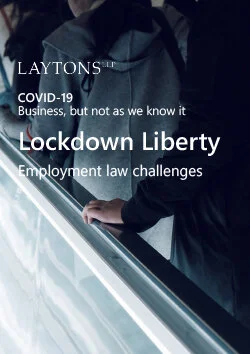Employment | Disputes
Our Employment team advises on all manner of employment-related disputes, from grievances and disciplinaries to claims of unfair dismissal, equal pay, discrimination, victimisation, harassment and whistleblowing.
Our Disputes team complements our main employment practice by advising and taking action on issues such as:
protecting confidential information and trade secrets
enforcing restrictive covenants to control team moves and prevent poaching of business, customers, key employees and suppliers
investigating employee fraud and taking action to secure, trace and recover assets
We recognise the importance of identifying the issues at stake both in terms of the immediate dispute and also in a wider context. This often involves many factors such as the client's broader commercial objectives, and the priorities for its business and its reputation. In this way the dispute may be managed with a view to meeting or protecting these priorities whilst also being mindful of the importance of cost-effectiveness and limiting disruption.
Employment Tribunals
We have extensive experience of Employment Tribunal claims acting for both employers and employees across the spectrum of employment claims.
Work includes:
acting for an employer in a complex Employment Tribunal claim relating to TUPE
acting for a high-profile fund manager in claims of constructive unfair dismissal and whistleblowing
successfully defending claims of discrimination bought by the former partner of a law firm
advising on the territorial scope of the Employment Tribunals in relation to the Equality Act 2010 and the UK laws in relation to discrimination
Boardroom Disputes
Our Employment team has advised on the resolution of numerous boardroom and shareholder disputes. We provide advice on the rights of all parties and the options available to them. Together with our Corporate team, we have significant experience in assisting directors and boards of directors with day-to-day operational needs and in drafting shareholder agreements and articles of association which anticipate and provide for dealing with boardroom disputes.
Confidential information, trade secrets and restrictive covenants
We can take quick and decisive action to safeguard your business against action by employees, leavers and competitors intending to take unfair advantage of your investment in your confidential business information, customers, key personnel and supplier relations. We can assist you to investigate suspicions that employees or leavers may be acting against your interests. We often work in conjunction with forensic IT experts to gather and identify evidence of conduct that may place your business at risk. We understand there is often a need for discretion in investigations and swift action once evidence of potential harm is discovered. We regularly act in claims involving court applications for urgent injunctions to prevent or minimise harm. We act both for employers whose businesses are threatened and for employees facing the threat of claims by their employers.
Work includes:
securing urgent injunctive relief to prevent misuse and procure return of confidential information taken by senior employees planning to set up in competition
investigating and taking swift action to secure undertakings and procure the return of confidential information misappropriated by employees
defending allegations by a former employer of misuse of confidential information by a former senior employee on leaving the company
Employee fraud
We can assist in forensic investigations into employee fraud. We can assist you in dealings with the relevant authorities. We are experienced in taking action against errant employees and others into whose hands your stolen assets may have passed, to secure, trace and recover your assets.
Work includes:
taking action to recover a six-figure sum stolen by an employee
investigating and tracing assets to recover sums stolen by senior accounting staff
Related Expertise
Our Team
News & Insights
Sign up for our upcoming Employment Law Seminar where Employment team members Nicholas Lakeland, Victoria Brockley, Marianne Johnson and James McConkey discuss key employment law developments for 2025 and their impact on workplace practices and compliance.
Whilst the joyful festivities of the ‘Christmas party season’ offer employees an opportunity to ‘let their hair down’, enjoy socialising and lift team morale; employers must navigate the yuletide period with caution, ensuring that ‘harmless banter’ does not encroach on inappropriate behaviour or worse, sexual harassment.
The much-anticipated Employment Rights Bill has introduced pivotal changes aimed at strengthening worker protections, particularly around collective redundancies and fire and rehire practices.
On 16 September 2024, the Supreme Court ruled on the employment status of part-time referees engaged by Professional Game Match Officials Ltd (PGMOL), a decision with significant implications for tax and National Insurance contributions.
Sign up for our Autumn Employment and Immigration Law Seminar, with Nicholas Lakeland, Victoria Brockley, Marianne Johnson, Victoria Welsh and Firuza Ahmed on Tuesday 10 September 2024.
Following the King’s speech, we now have clarity on the Prime Minister’s legislative programme and the forthcoming Employment Rights Bill.
The results are in! Following 14 years of a Conservative government, the British public have voted for a change. In terms of what this change means for employment law, Labour promised to bring forward an employment bill of rights within its first 100 days of coming into power as part of its “New Deal for Working People”. As of today, that clock starts ticking.
Immigration Partner, Victoria Welsh, and Employment Partner, Nicholas Lakeland, explore the issues that can arise when businesses allow employees to work remotely overseas, in this article written for People Management.
As legislative adjustments in employment law persistently emerge, employers are advised to regularly reassess their contracts and policies to ensure compliance with the evolving legal landscape. We outline the upcoming changes set to take effect from April 2024.
Sign ups are now open for our upcoming Employment and Immigration seminar! Our very own Employment Partners, Nicholas Lakeland and Victoria Brockley, will delve into the latest updates in Employment Law. This will be followed by our Partner and Head of Immigration, Victoria Welsh, as she analyses the recent amendments to UK Immigration Law and the implications on UK businesses.
April is always marked as a busy time of the year for employment lawyers and HR professionals having to adjust the increased limits for awards.
Here are some examples of cases where employers have taken disciplinary action regarding an employee’s comments on social media about their employer.
Ahead of the expected changes for employment law this year, we look back at the implications of the cases that took place in 2022, and what we can expect in 2023.
You will have heard that P&O Ferries fired 800 staff with immediate effect in March 2022. Similarly, technology company Meta and social media giant Twitter have laid off thousands of staff in an attempt to significantly reduce costs.
It’s remarkable how often the title ‘director’ is used to describe someone’s position in a business. The title confers a sense of importance which is why it is often used but being a ‘real’ director brings with it a considerable degree of responsibility and potential liabilities, and if this was more widely understood there would be a greater reluctance to so casually use the title.
When advising employees about redundancy exits, it seems many employees are acting under the misconception that their contractual post-termination restrictions will not apply because their termination is by reason of redundancy. This is not correct, as the restrictions will apply even in redundancy terminations. It is worth noting, however, that the circumstances of 2020 may actually mean not all the restrictions are relevant even if they are still applicable.
As we slowly inch our way towards a brave new world post COVID-19 we set out below the employment law issues likely to face employers and employees in the coming months.
The government guidance has been continuously changing and this article is therefore inevitably a general exposition of key features of the scheme and specific advice should be sought in relation to the furloughing of employees.
The review, which was published on 4 November 2019, also concluded that despite the potential for minimum wages to have a negligible or zero effect on jobs, it significantly increases earnings of the lowest paid workers. Nicholas Lakeland, partner at Laytons, comments on the report, saying it will ‘frame the future remit of the Low Pay Commission… and future government policy’.
Employment lawyers and HR teams are well acquainted with the routine dance involved in the negotiation of settlement agreements. However, it is important to note that HMRC has decided to make some changes which will affect some of the steps taken when negotiating exit payments.



























